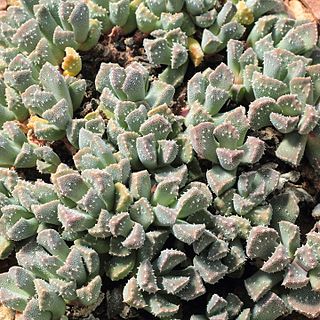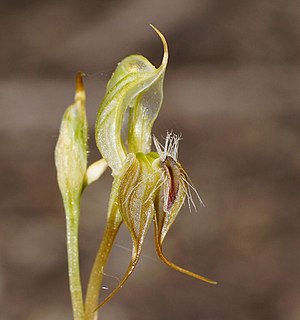Related Research Articles
Dalbergia setifera is a low growing shrub in the family Fabaceae. It is found only in Ghana. It is threatened by habitat loss.

Salsola is a genus of the subfamily Salsoloideae in the family Amaranthaceae. The genus sensu stricto is distributed in central and southwestern Asia, North Africa, and the Mediterranean. A common name of various members of this genus and related genera is saltwort, for their salt tolerance. The genus name Salsola is from the Latin salsus, meaning "salty".

Limatula, the file shells or file clams, is a genus of marine bivalve molluscs in the family Limidae.

Caesia is a genus of herbs in the family Asphodelaceae, subfamily Hemerocallidoideae, native to Australia, New Guinea, Madagascar and Southern Africa. The mostly 3-lobed seed capsules contain rounded black seeds. The genus was named in honour of Federico Cesi (1585-1630), an Italian scientist.
- Caesia alpina Hook.f. - alpine grass-lily - New South Wales, Tasmania, Victoria
- Caesia calliantha R.J.F.Hend. - blue grass-lily - New South Wales, Tasmania, Victoria, South Australia
- Caesia capensis(Bolus) Oberm. - Cape Province of South Africa
- Caesia chlorantha F.Muell. - New South Wales, Queensland, Western Australia
- Caesia micrantha Lindl. - New South Wales, Tasmania, Victoria, South Australia, Western Australia, Queensland
- Caesia occidentalis R.Br. - Western Australia
- Caesia parviflora R.Br. - pale grass-lily - Queensland, New South Wales, Tasmania, Victoria, South Australia, Western Australia
- †Caesia rigidifolia F.Muell. - Queen Victoria Springs in Western Australia but extinct. Last recorded near Zanthus in 1875.
- Caesia sabulosaBoatwr. & J.C.Manning - Cape Province
- Caesia setifera Baker - Queensland, Western Australia, Northern Territory, New Guinea
- Caesia subulataBaker - Madagascar
- Caesia viscida Keighery - Western Australia

Phryganodes is a genus of moths of the family Crambidae described by Achille Guenée in 1854.
Brigalowia setifera is a species of beetle in the family Carabidae, the only species in the genus Brigalowia.

Coleochloa is a plant genus in the family Cyperaceae. It is found in sub-Saharan Africa and on the Island of Madagascar.
Trichohestima is a genus of beetles in the family Cerambycidae, containing the following species:

Aerenea is a genus of longhorn beetles of the subfamily Lamiinae.

Aloinopsis setifera is a species of succulent plant, native to Southern Africa.
Trichohestima biroi is a species of beetle in the family Cerambycidae. It was described by Breuning in 1953.

Trichohestima unicolor is a species of beetle in the family Cerambycidae. It was described by Breuning in 1959.
Aerenea setifera is a species of beetle in the family Cerambycidae. It was described by Thomson in 1868. It is known from Brazil.
Petriella setifera is a fungus commonly found in soil and feces. The fungus has also been located on wood rot, plant species, and compost. A significant portion of P. setifera reports are found on sources with no previous association with the fungus. There are no known human cases of fungal infection, but one reported case of a dolphin infection. The fungus may have immunosuppressive characteristics, but it has not been confirmed. Many properties of the fungus are unknown, requiring further research.
Bursellia is a genus of African dwarf spiders that was first described by Å. Holm in 1962.
Corusca is a genus of Chinese jumping spiders that was first described by Y. Y. Zhou & S. Q. Li in 2013.

Pterostylis setifera, commonly known as the bristly rustyhood or sikh's whiskers, is a plant in the orchid family Orchidaceae and is endemic to south-eastern Australia. It has a rosette of leaves and four to ten translucent white, green and brown flowers which have an insect-like labellum with long, bristly hairs.
Panorpa setifera is a species of common scorpionfly in the family Panorpidae. It is found in North America.
Cornulaca is a genus of flowering plants belonging to the family Amaranthaceae.
Hibbertia setifera is a species of flowering plant in the family Dilleniaceae and is endemic to south-eastern continental Australia. It is a small, grey shrub with erect to spreading branches, linear leaves and yellow flowers with eight or nine stamens in a single cluster on one side of two hairy carpels.
References
- ↑ BioLib.cz - Trichohestima setifera. Retrieved on 8 September 2014.